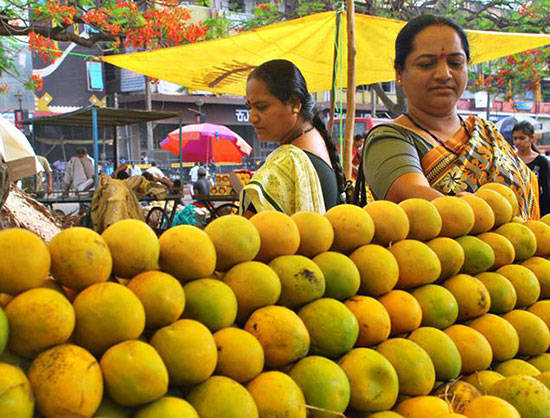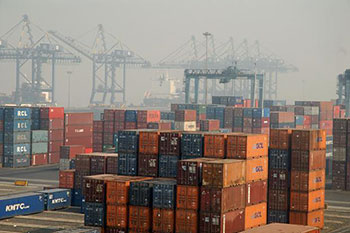Prof opens dialogue on the EU’s import ban on mangoes from India

Mon, 15 Sep 2014 16:08:00 BST
Professor Samir Dani joins trade talks with the Department for Environment, Food and Rural Affairs and the Indian business community
 WHEN the EU banned the import of mangoes from India this summer, the move was a serious annoyance for lovers of the exotic fruit. But it was a major financial blow to a large number of UK businesses, including importers and retailers.
WHEN the EU banned the import of mangoes from India this summer, the move was a serious annoyance for lovers of the exotic fruit. But it was a major financial blow to a large number of UK businesses, including importers and retailers.
The ten-week mango season directly generates £10 million of economic activity in Britain, and the ban – intended to last until at least the end of 2015 – has also had serious knock-on effects for small Asian businesses in the UK. The University of Huddersfield’s Professor Samir Dani has been closely involved in roundtable talks designed to modify or lift the ban and now he has used it as a case study for a paper presented at a major international conference.
“This episode shows the lack of clear communication across national boundaries in terms of regulation and that there has to be a more intelligent regulatory framework,” says Indian-born Professor Dani, who is an advisory board member of Leicestershire Asian Business Association, which is a component of the National Asian Business Association.
London talks
At the University of Huddersfield he is Professor of Logistics and Supply Chain Management in the Business School. Earlier in 2014 he took part in talks at the London headquarters of the Department for Environment, Food and Rural Affairs (Defra). In attendance were several Defra representatives, plus key figures from the Indian business community and representatives of the National Asian Business Association, the Confederation of Indian Industry, the Federation of Indian Chambers of Commerce and Industry and the Indian High Commission. The talks were chaired by Lord de Mauley, who is Parliamentary Under-Secretary of State for Natural Environment and Science.
The meeting was told by the business representatives that the ban on the import of mangoes and four other fruits and vegetables from India was a “disproportionate” response to an alleged infestation with fruit flies non-native to Europe. In addition to direct economic losses during the mango season, there would also be the secondary impact of lost footfall in small Asian shops.
The briefing document prepared for the talks stated that: “The British Asian business diaspora and the Indian export supply chain need to find not only a quick and robust solution to clearing the mangoes for sale in the UK...but also create a long-term solution to this challenge.”
Breaking down barriers
 Pictured left: India's export trade
Pictured left: India's export trade
Professor Dani was then invited to take part in a London conference named Inspection Reform: Breaking Down Barriers to Trade and Investment. Drawing large numbers of international delegates, it was organised by the World Bank Group and the Better Regulation Delivery Office, which is part of the Department for Business Innovation and Skills. Professor Dani’s contribution came in a segment that addressed challenges in international trade in food.
He described the response of the National Asian Business Association to the mango ban and its economic repercussions. He depicted how the support of the National Asian Business Association in extensive lobbying to seek a solution created a collective effort that included a wide range of trade bodies and agencies, plus the Indian High Commission.
The vision, Professor Dani told his conference was to create a world-class platform of intelligent regulation, including a genuine two-way dialogue between UK regulators and Indian exporters. Professor Dani said: “The conference was a success in bringing representatives from 57 countries to the UK to discuss the need to create smart and intelligent regulation, to reduce the burdens of inspection and regulation for small businesses and in turn reduce the barriers for international trade.”
- Originally an engineer in his native India, Professor Dani launched an academic career when he relocated to the UK and began to specialise in the field of logistic and supply chain management. But he believes in the importance of retaining ties with industry. He has been involved with the Joint Economic Trade Committee between the Indian and UK governments, works closely with the Confederation of Indian Industry, UKTI and the Indian High Commission. He stresses the importance of supply chains for both the SME sector and for regional economic regeneration.







